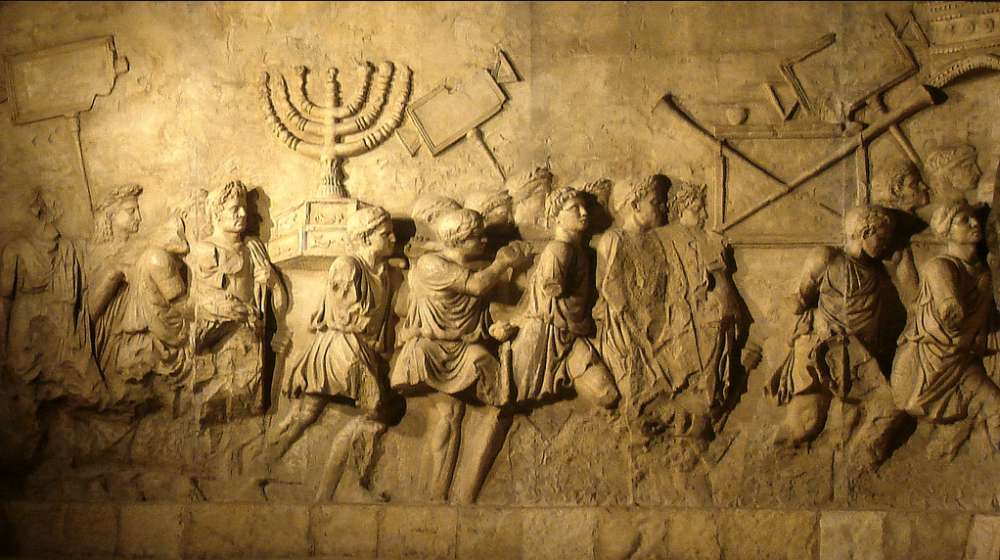A few centuries later the Romans invaded and made Palestine a province of the “Holy Roman Empire”.
Most educated people have some idea of the origins of Islam, and the doctrines by which Muslims live, but do educated Muslims anywhere have the faintest notion of the origins of Judaism? I’ll tell that story as best as I can:
The word “Jew” is derived from the region of Judea that existed in Biblical times, meaning at least 2,000 years bce (before common era). Thus, whoever lived there was a Jude or a Judean. It was the seat of King David’s domain and home to his great temple in Jerusalem. In 587 BCE, Judea was invaded and occupied by the Babylonians, a fighting people who lived in what’s Iraq now and is still known as the Babil district, about 5 square miles.
The Babylonians destroyed the Temple of David and took 10,000 Judeans or Jews to their homeland as prisoners. These Jews over the years flourished in their new home, but missed the Temple. Their leaders wrote letters to the Temple authorities in Jerusalem to seek advice as to how they were to conduct their lives away from the Temple? The answer they received was the essence of wisdom that has been one reason why Jews have persevered over the centuries in diverse lands, as a minority.
The Temple authorities wrote to the separated Jews to be loyal to the land where they lived and strive for its success and glory, while, at the same time, pray toward Jerusalem, preserving at home the rituals they had been taught.
A few centuries later the Romans invaded and made Palestine a province of the “Holy Roman Empire”. Around the birth of Jesus, which was noted in Roman records, there was widespread belief among the Jews that the world was ending. “The end times are neigh!” foreign yoke would be lifted, a new David would be born in the form of a messiah, the savior. Jesus was just a preaching rabbi, a Cohan. But he preached against greed and violence, and denounced church leaders. Jesus acquired a devoted following. The group was seen as a bunch of dangerous rebels. They reported the rebels to the Roman governor, Pilate. The rulers had a standard punishment for rebellion — nailing to the cross.
Judean / Jewish tribes had been migrating out of Palestine in droves to escape tyranny, or drought years, and settled in foreign lands as far flung as Kiev and the Coromandel coast in southwestern India. There are many theories regarding the scattering of the Jewish tribes all over the world.
Any account of the Jewish history must include the great pre-Renaissance Andalusian history in which the Jewish traders and intellectuals shared power with Muslims and Christians, from the 8th century to 1492, the year Grenada fell, and Columbus sailed the ocean blue.
Rabbis, the Torah and the Talmud
The Muslim scholars or ulema do not come close to the responsibilities rabbis have always had. Any Jewish man migrating to a new place was expected to find a partner within a congregation with whom to explore the Jewish history and philosophy, and the meanings of the Torah. The Jewish scriptures, or the Old Testament, has been culled for meanings over thousands of years by the rabbis. It is the source of some 600 laws recorded in what is known as Talmud. Rabbis apply the Talmudic wisdom to matters great and small. So it is that Jews who wanted to live a moral life in accordance with the teachings of the Talmud, they turn to the rabbi and ask: What guidance will Talmud have to a particular family situation, or to a larger problem.
“What does the Talmud say now, Rabbi, in light of all this new knowledge”? It is assumed that the meanings change. It is utterly important to find guidance in Talmud in light of totally new circumstances. Which of the laws would be found to inoperative, and which other law applicable. That’s the question for a rabbi. He has to wrestle with the reasoning process, induction and deduction. Collectively, the rabbis would decide what changes in customs, theology and sociology are in order. They control the gates. The Muslim ulema come nowhere near the rabbis in adapting to social change.

